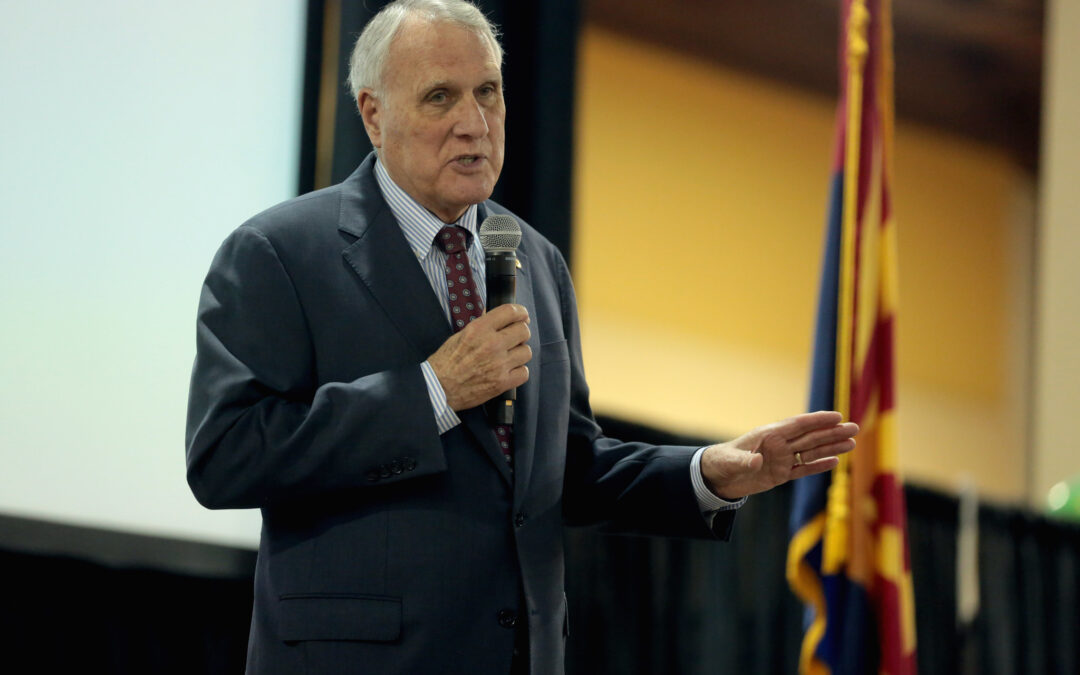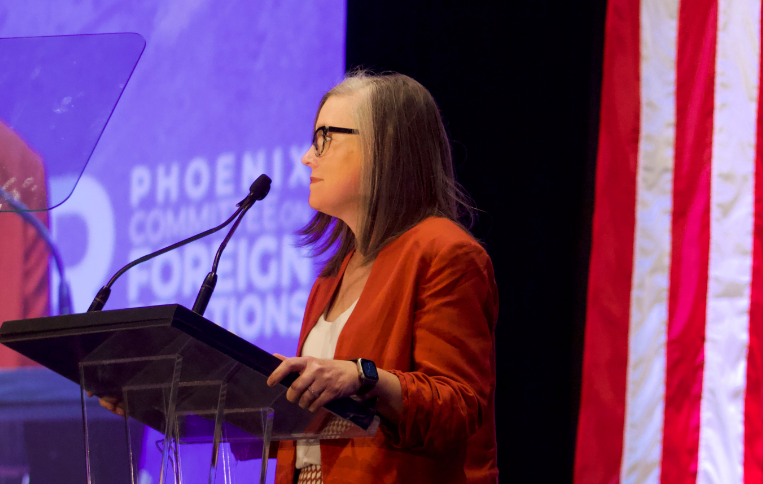
by Ethan Faverino | Jan 5, 2026 | News
By Ethan Faverino |
The U.S. Department of Homeland Security (DHS) and U.S. Immigration and Customs Enforcement (ICE) remain steadfast in their core responsibility to defend American communities by apprehending and removing dangerous criminal offenders, even as political leaders intensify efforts to undermine these essential law enforcement operations.
In a recent action, DHS and ICE arrested Anel Billy Irigoyen Portillo, a criminal illegal alien from Mexico previously convicted in the United States District Court for the District of Arizona for importing fentanyl—a deadly narcotic that has ravaged families, fueled widespread addiction, and claimed countless lives across Arizona and the nation.
Portillo’s arrest is in line with the focus of DHS and ICE to target narcotics traffickers and other violent offenders who pose direct threats to public safety.
“While federal agents conduct lawful operations to protect public safety, newly elected Congresswoman Adelita Grijalva has chosen to publicly attack DHS and ICE, portraying enforcement actions as misconduct rather than acknowledging the clear and documented threat posed by violent criminal offenders,” said Representative John Gillette (R-LD30). “This rhetoric undermines law enforcement, encourages resistance to lawful authority, and erodes respect for the rule of law at a time when clarity and cooperation are essential.”
In a press release, Gillette called on officials in Pima County to prioritize full cooperation with DHS and ICE, rather than engaging in obstruction, delays, or politicalization of federal efforts. He urged the following actions to ensure the protection of Arizona communities:
- Complete cooperation between Pima County and federal law enforcement.
- Effective operational coordination with DHS and ICE.
- Termination of political attacks that disrupt lawful enforcement activities.
“DHS and ICE are doing the job the American people expect—removing violent criminals and drug traffickers from our communities,” Representative Gillette added. “Arizona does not need political grandstanding that shields offenders and targets law enforcement. The public wants dangerous individuals removed, and they want their elected officials supporting—not sabotaging—the mission. This issue is not ideological. It is about public safety, the rule of law, and standing with the men and women charged with protecting our communities and our country.”
Ethan Faverino is a reporter for AZ Free News. You can send him news tips using this link.

by Ethan Faverino | Jan 5, 2026 | Economy, News
By Ethan Faverino |
The Industrial Commission of Arizona announced the state’s minimum wage has increased to $15.15 per hour effective January 1, 2026, up from the current minimum wage of $14.70.
This $0.45 adjustment, mandated under A.R.S. § 23-363(B) and the Fair Wages and Healthy Families Act, reflects the rise in inflation from August 2024 to August 2025. The change highlights Arizona’s commitment to tying wage growth to economic realities, ensuring minimum-wage earners can better keep pace with living costs.
Certain exemptions apply under the Act, including employees of parents or siblings, casual babysitters in an employer’s home, workers for the State of Arizona or the U.S. government, and small businesses grossing less than $500,000 annually if exempt under federal law.
For tipped employees, employers may pay up to $3.00 below the minimum wage, provided they maintain records demonstrating that the employee’s combined wages and tips meet or exceed the minimum wage for all hours worked. This move aligns with a broader national trend where more than half of U.S. states now exceed the federal minimum wage of $7.25 per hour, unchanged since July 24, 2009—the longest period without an update since its inception in 1938.
Over the past decade, 30 states and Washington, D.C., have raised their minimum wages above the federal level. This momentum, driven by labor advocates and shifts in economic policy, recognizes that $7.25 is insufficient for a basic standard of living in most areas.
In 2026 alone, 23 jurisdictions—including 22 states and Washington, D.C.—have implemented or announced increases, reflecting a growing consensus on wage equity.
Arizona’s new rate of $15.15 positions it among 18 states where the minimum wage now tops $15 per hour. Washington, D.C., leads the nation with a minimum wage of $17.95 per hour, followed by Washington State ($17.13), New York ($17), Connecticut ($16.94), California ($16.90), Hawaii ($16), and Rhode Island ($16).
Ethan Faverino is a reporter for AZ Free News. You can send him news tips using this link.

by Ethan Faverino | Jan 4, 2026 | News
By Ethan Faverino |
U.S. Representatives Paul Gosar (R-AZ-09) and Eli Crane (R-AZ-02) have reintroduced H.R. 6374, landmark legislation that would impose a complete 10-year moratorium on all immigration into the United States.
The bill, titled simply as a measure “to prohibit the admission of aliens to the United States for 10 years, and for other purposes,” would halt all new admissions of foreign nationals beginning on the date of enactment and continuing for a full decade.
In a joint announcement, the Arizona lawmakers cited the ongoing border crisis, overwhelming immigration systems, national-security vulnerabilities, and recent deadly incidents involving individuals who entered the country under prior policies as urgent reasons for the drastic pause.
Rep. Gosar issued the following statement:
“[The] tragic shooting of two National Guard members in Washington, D.C., within a few feet of the White House on Thanksgiving eve by Afghan national Rahmanullah Lakanwal is a sad reminder of Joe Biden’s reckless and unchecked open-border policies. Our immigration system is overwhelmed and unmanageable, thanks in large part to the previous administration’s open border policies, poorly vetted asylum claims, and visa overstays. We cannot maintain a lawful immigration process when we cannot control our borders or account for who is entering our country.
Fraudulent asylum claims, illicit trafficking, and insufficient vetting present real threats to our national security, our economy, and our citizens. Adversaries are exploiting these failures. Americans are being murdered. Meanwhile, schools, hospitals, law enforcement, and local governments—especially in border states like Arizona—are stretched to their limits.
Immigration must be legal, orderly, and in the national interest. Every nation has the right and responsibility to secure its borders and protect its people. I’m proud to join my friend and colleague Representative Eli Crane in reintroducing this legislation, which imposes a 10-year moratorium on all immigration until our system is restored, our borders are secured, and future immigration can occur safely and in a way that strengthens our country.”
Rep. Crane added:
“One of our most important responsibilities as representatives is to protect the citizens of our great nation. Due to the premeditated border invasion under the Biden administration, Americans have faced devastating consequences. I’m proud to join Rep. Paul Gosar in introducing this sensible legislation to restore stability and help reestablish security within our borders.”
The legislation is straightforward: for ten years following enactment, no alien may be admitted to the United States under any category or program. Supporters argue the pause is necessary to allow Congress and federal agencies to fix vetting procedures, close legal loopholes, deport criminal aliens, and restore operational control of the southern and northern borders.
Ethan Faverino is a reporter for AZ Free News. You can send him news tips using this link.

by Ethan Faverino | Jan 3, 2026 | News
By Ethan Faverino |
Former United States Senator from Arizona and a key figure in Republican leadership, Jon Kyl, has revealed that he has been diagnosed with dementia and is withdrawing from public life. In a heartfelt statement, Kyl expressed gratitude for his family’s support while acknowledging the challenges ahead.
“My family and I now head down a path filled with moments of joy and increasing difficulties,” said Kyl. “I am grateful beyond expression for their love and support, in these coming days as in all the days of my life. Despite this diagnosis, I remain a very fortunate man.”
Kyl first entered Congress in 1987, representing Arizona’s 4th Congressional District in the U.S. House of Representatives until 1995. That year, he transitioned to the Senate, where he served Arizona from 1995 to 2013. During his final years in the upper chamber, Kyl rose to the position of Senate Minority Whip, the second-highest role in Republican Senate leadership.
Following his initial retirement from the Senate in 2013, Kyl’s expertise was called upon again in 2018 when former Arizona Governor Doug Ducey (R) appointed him to fill the vacancy left by the late Senator John McCain. Kyl served in this capacity through the fall of 2018 and played a pivotal role in the nomination of Supreme Court Justice Brett Kavanaugh, before resigning from the seat in December 2018.
As Kyl steps back from public engagements due to his health, his legacy as a dedicated public servant and advocate for Arizona remains firm. Friends, colleagues, and family have rallied around him, emphasizing the profound impact he has made on the nation.
Here are a few brief reactions from people directly impacted:
“Senator Jon Kyl was one of the first elected officials I met when I broke into politics at age 16, and I’ve looked up to him ever since. He was a staunch conservative, a noble statesman & a true public servant. Praying for him and his family and thankful for his life of service.” – Daniel Stefanski on X .
“A mentor, a friend and a confidant. Not sure I would have been Governor without his counsel and encouragement. Senator Jon Kyl is a giant set forth in the tradition of Arizona’s own Barry Goldwater. All my deepest love and prayers to him and the entire Kyl family,” posted former governor Doug Ducey on X.
“There is not a current or former GOP elected official or political staffer who hasn’t been positively impacted by Sen. Jon Kyl’s example of leadership, wisdom, and kindness. He’s a true statesman. He will face this with grit and humility,” said political consultant Sean Noble on X.
“Our state and nation are stronger thanks to Jon Kyl’s leadership and service. A brilliant legal mind and dedicated statesman, his impact is lasting — including at ASU. Now it’s our turn to be present and support Jon and his family in the days ahead,” posted ASU president Michael Crow on X.
Ethan Faverino is a reporter for AZ Free News. You can send him news tips using this link.

by Ethan Faverino | Dec 30, 2025 | News
By Ethan Faverino |
Arizona Governor Katie Hobbs strongly condemned the Federal Emergency Management Agency’s (FEMA) decision to deny the state’s request for a Major Disaster Declaration following the devastating floods that struck Gila and Mohave Counties from September 25-27, 2025.
Governor Hobbs announced plans to appeal the decision, emphasizing the urgent need for federal support to rebuild infrastructure, homes, and lives in these rural areas.
“The people of Gila and Mohave County were devastated by flooding from severe monsoon storms this September,” said Governor Katie Hobbs. “Now, they’ve been denied support from the federal government with little explanation. By denying much-needed relief, this administration is leaving Arizonans out on their own after their homes, businesses, roads, and bridges were decimated by historic storms. I will appeal this reckless decision and continue doing everything in my power to ensure Arizona communities don’t pay the price for the federal government’s senseless policies.”
The floods, triggered by a stalled monsoonal moisture system that dumped six to ten inches of rain in just 48 hours, overwhelmed local watersheds, including Pinal Creek, Miami Wash, Russell Gulch, and Keller Canyon.
Rapid runoff led to flash floods, debris flows, and widespread destruction across Globe, Miami, Claypool, Hayden, Winkelman, and other communities, including nearby Tribal nations.
Preliminary damage assessments revealed severe impacts: 312 homes were affected, with 64 destroyed, 89 suffering major damage, and 159 with minor to affected-level damage. More than 180 residents required emergency sheltering, and approximately 74 households lacked flood insurance.
Public infrastructure bore the brunt of the disaster with major damage to roads, bridges, utilities, and wastewater systems, including the loss of Globe’s city-owned wastewater system.
Total estimated losses stand at $33,579,081, broken down as follows:
- Residential: $4,100,000 for 312 damaged homes.
- Public Infrastructure: $23,306,284 for roads, bridges, and utilities in Globe, Miami, and rural areas of Gila and Mohave Counties.
- Emergency Protective Measures: $4,721,112 for search and rescue, debris clearance, sheltering, and Emergency Operations Center (EOC) activities.
- Debris Removal: $1,451,685 for 175,000 tons of mixed debris.
Hobbs was slow to declare a State of Emergency following the catastrophic flooding, eventually doing so on September 27, 2025, prompted by local declarations from Gila County, Mohave County, the San Carlos Apache Tribe, the Town of Miami, the City of Globe, and others.
State resources, including the Arizona Division of Emergency Management (DEMA), were fully mobilized, activating the EOC, deploying the incident management team, and coordinating evacuations, shelters, and rescues.
Local leaders echoed the Governor’s call for reversal:
Gila County Board of Supervisors District One Supervisor and Chairman Steve Christensen: “Devastation from our recent and profound flooding in southern Gila County has left many in financial ruin, homes destroyed, infrastructure destroyed or badly damaged, as well as loss of life. Gila County is left with significant challenges that we can never meet standing alone. Assistance from FEMA is vital, without which we will not recover to any level of the restoration needed. Please approve funding immediately for the work we MUST do in Gila County.”
Globe Mayor Al Gameros: “I want to thank Governor Hobbs, as well as the strong bipartisan support from our congressional delegation, for requesting a FEMA Major Disaster Declaration in response to the devastating floods that resulted in the death of three residents, and destroyed parts of our historic downtown, critical infrastructure such as bridges and roads, as well as numerous community assets. These floods caused historic and unprecedented damage and have forever transformed our small, tight-knit rural communities. Our community is extremely disappointed by FEMA’s short-sighted decision to deny the State’s Major Disaster Declaration, and we respectfully request that it reexamines its methodology and determines that this devastating flood event meets the critical criteria. I strongly urge FEMA to reverse course and immediately issue an approved Major Disaster Declaration.”
Miami Mayor Gil Madrid: “Miami is a strong and resilient community, and I know we can build back from this devastation, but this is a frustrating setback that will have a real impact on our families and businesses. I will continue working with state and local partners to ensure we get the support we need from the federal government to support our community. I urge the U.S. Department of Homeland Security to reconsider their decision and deliver this important relief to my city after we were struck by historic flooding.”
Ethan Faverino is a reporter for AZ Free News. You can send him news tips using this link.





